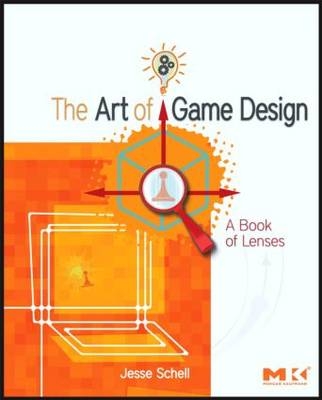
The Art of Game Design
Focal Press US (Verlag)
978-0-12-369496-6 (ISBN)
- Titel erscheint in neuer Auflage
- Artikel merken
Anyone can master the fundamentals of game design - no technological expertise is necessary. The Art of Game Design: A Book of Lenses shows that the same basic principles of psychology that work for board games, card games and athletic games also are the keys to making top-quality videogames. Good game design happens when you view your game from many different perspectives, or lenses. While touring through the unusual territory that is game design, this book gives the reader one hundred of these lenses - one hundred sets of insightful questions to ask yourself that will help make your game better. These lenses are gathered from fields as diverse as psychology, architecture, music, visual design, film, software engineering, theme park design, mathematics, writing, puzzle design, and anthropology. Anyone who reads this book will be inspired to become a better game designer - and will understand how to do it.
Jesse Schell is professor of entertainment technology for Carnegie Mellon University's Entertainment Technology Center (ETC), a joint master's program between Carnegie Mellon's College of Fine Arts and School of Computer Science, where he teaches game design and leads several research projects. Formerly he was creative director of the Walt Disney Imagineering Virtual Reality Studio. Schell worked as a designer, programmer, and manager on several projects for Disney theme parks and DisneyQuest. Schell received his undergraduate degree from Rensselaer Polytechnic Institute and a master's degree in information networking from Carnegie Mellon. He is also CEO of Schell Games, LLC, an independent game studio in Pittsburgh, and chairman of the International Game Developers Association (IGDA). In 2004 he was named as one of the World's 100 Top Young Innovators by MIT's Technology Review.
Introduction; The History of Games; The Most Important Skill; Holographic Design; The Cycle of Design; Excerpt: Lehman and Witty: The Psychology of Play (1927); The Psychology of Play; The Spectrum of Humanity; Excerpt: Julian Jaynes: The Orgin of Consciousness in the Breakdown of the Bicameral Mind, Chapter One: The Consciousness of Consciousness; The Subconscious Mind Part I: The Player; Excerpt: Salvador Dali: Fifty Secrets of Magic Craftsmanship: Secret Number Three: Slumber With a Key; The Subconscious Mind Part II: The Designer; Essay: Greg Costikyan: I Have No Words and I Must Design; What is a Game?; The Elements of Game Mechanics; Toy Design; State and State Change; Skill and Chance; Decisions; Feedback- The Heart of Interactivity; Interfaces; Patterns of Rewards; Game Balancing; Case Study: Deconstructing Pac-Man; Essay: Scott Kim: What is a Puzzle?; Puzzle Principles; The Psychology of Story; Interactive Stories: The Promise and the Problem; Story and Gameplay- The Conflict and Solution; Story and Game Worlds; Lessons from Tabletop RPGs; Essay: Henry Jenkins: Transmedia Worlds; Transmedia Worlds; Excerpt: Scott McCloud: The Vocabulary of Comics (from Understanding Comics); Characters in Games; Excerpts: (various) Christopher Alexander: A Pattern Language; Architecture in Games (Level Design); Elegance; Character in Games; Essay: Brian Moriarty: The Point; Social Principles in Multiplayer Games; Online Communities; Technology; Iteration; Playtesting; Brainstorming; Team Communication; Design Documents; Business; The Art of the Pitch; Excerpt: Mills Penny Arcade (1920); Location Based Entertainment; Serious Games; The Ethics of Games; The Deepest Theme; The Future; Your Secret Responsibility
| Erscheint lt. Verlag | 12.9.2008 |
|---|---|
| Verlagsort | Burlington |
| Sprache | englisch |
| Maße | 191 x 235 mm |
| Gewicht | 1089 g |
| Themenwelt | Informatik ► Software Entwicklung ► Spieleprogrammierung |
| ISBN-10 | 0-12-369496-5 / 0123694965 |
| ISBN-13 | 978-0-12-369496-6 / 9780123694966 |
| Zustand | Neuware |
| Haben Sie eine Frage zum Produkt? |
aus dem Bereich



